- Home
- Tim Lebbon
Vale of Blood Roses Page 5
Vale of Blood Roses Read online
Page 5
“Your friends denied us as well,” the woman says. “The woman died fighting. And right until the end, Rufiere claimed that we shouldn’t exist.”
“What happened to him?”
“We seeded him as we’ve seeded your wife and child. Sat with him. The blooms give us our strength, as the heart and mind draws strength from the valley blooms.”
“Barr told me Rufiere was dead.”
“He is. It took three moons.”
Jakk shakes his head but he cannot deny what is happening. “Free them,” he says, trying to keep the plea from his voice. If he sounds strong, perhaps they will find pity.
“Find us the valley and I’ll come back and free them myself,” the woman says.
I don’t know where it is, Jakk thinks. “Of course,” he says.
The woman backs away and allows him to stand.
Bindy is still unconscious but her sleep seems deeper now, more certain. And when Jakk walks the few steps to Romana – and the folded people allow him that walk – he can see that her movements are now involuntary. Her eyelids flutter and limbs twitch, but she is somewhere away from here.
“How can we take them if they’re not awake?” he asks, struggling to hold the tears. He wants to fight, but he knows that these things can kill him easily. He wants to rage, but he swore long ago never to let that fury take him again. If anything, he feels resigned to what is happening. Guilt is already leaving its stale taste in his mouth.
“They stay here,” the woman says. “The faster we move, the sooner you can return.”
They’ll die, Jakk thinks. The forest is not a safe place, especially at night. But saying it will do no good. His uncertain life has passed, and reality has caught up with him at last.
*
They came like a flood, throwing stones and sticks, mugs and bottles, closing in on them from all sides. Though he had been expecting it, Jakk was still shocked at the sudden violence. Today had started well – their journey north continuing, a place he could call home drawing ever-closer – but it would end as many days had ended over the years. Perhaps worse.
Jakk used arrows to begin with, taking down three, and when they drew closer he shouldered the bow and started flinging throwing stars with both hands. They whistled through the air, and every one found flesh. The stars would not kill unless they struck the throat or severed arteries, but a dozen people fell in agony, clutching wounds that held on fast to the barbed weapons.
He wanted to shout at them to stop. Not through fear, although every fight exposed his own mortality, but through hopelessness. There was no reason for this; they were not enemies, and now this village’s ground would be tainted with needless blood.
He glanced around at the others and saw that they were enjoying this. They fought with sword and spear, crossbow and slingshot, their killing moves honed over dozens of battles and years of war. Even Rufiere was in the thick of it, perhaps relishing the distraction from wondering where and when they were.
Jakk threw his last metal star and held his left arm out to the side, raising his hand and bracing his legs. When the first villager came close enough – a young man, barely old enough to trim his facial hair – Jakk launched the slingshot. Its weight sprang out, fine wire stretching taut, and a head span through the air.
Nobody seemed to notice. They screamed and screeched, and none of these people were fighters. There were bakers and farmers, shopkeepers and fruit growers, but the sight of a decapitated body spewing blood did nothing to slow them down. Whatever travesty Jakk and the others had performed had driven these people close to madness.
“The dome!” Leeza shouted.
Jakk drew his sword and backed up. The attackers kept on coming. Whatever rage possessed them threw them forward onto the mercenaries’ blades, and screams of rage turned to pain. He thrust, withdrew, slashed, stepped back, and he was splashed with their blood.
He half-turned and grabbed hold of a closed shutter, kicking out as he hauled on it. A crossbow bolt whisked by his face and struck a villager in the chest, driving the man back. He dropped a long butcher’s knife as he fell.
“Up!” Rufiere shouted.
Jakk slashed out with the sword one more time and then turned, grabbed the shutter properly and hauled himself up onto the stone dome.
The four of them stood there and fended off the attack. Standing atop the structure seemed to make the villagers even more furious, and some of them threw their children up onto the dome. The youngsters’ faces reflected the adults’ rage, and Jakk kicked out at them, trying to shove them back.
But soon there were too many and he could no longer merely push.
*
“What is it?” Jakk shouted. “What have we done?”
The sun had moved across the sky and now touched the western hills. Dead and injured villagers were piled around the base of the building, and others still climbed over them to reach the mercenaries. They were relentless, and so unprepared for a fight that Jakk felt sick at the slaughter. Barr was enjoying it – he was caked in drying blood, white teeth bared in a gruesome grin – and Leeza and Rufiere did what they had to do.
Jakk had stabbed a young boy through the stomach, and he could still see him squirming atop the pile of bodies.
An old woman had come at him with hands clawed, and he had kicked her back several time. But still she came. Soon he would have to kill her.
“What are we doing?” he shouted. In Ventgoria the enemy had been well-defined: Soyaran raiders, emerging from the Poison Forests to take advantage of the war and attack the Ventgorians. And they had been fighters, willing to take on Jakk and the others in their attempts to reach the Ventgorian marshes.
But this was slaughter, pure and simple. And Jakk did not think he could fight on.
A thrown knife struck his arm and sliced to the bone, and he grunted in pain. He lifted his crossbow and shot the thrower in the face.
Barr laughed, and Jakk turned to see the madman watching him.
“What’s in there?” Jakk shouted, pointing down at the stone beneath his feet. “What did you see?”
“Why do you think I’m fighting like this?” Barr called. “I want to find out!”
A beat later a great roar sounded. The attackers stopped where they were, seemingly frozen in place, every one of them looking at one of the scores of steam-clouds rising from the tall metal tubes. The tubes vented again, sending that loud roar reverberating around the village. As it died away Jakk heard its echoes from the distant valley slopes, and he wondered whether it could be heard throughout the folded valley.
Barr stepped forward and stabbed a prone man through the back of the neck. He slumped down and started bleeding to death, and the others around him simply moved back.
“Now!” Barr shouted. “While they’re like this, kill as many as—”
“Leave them alone, Barr,” Jakk said. The others looked at him but he stared them down, teeth grinding together. “No more killing.”
“No more?” Barr said. His left hand stole to his belt, reaching for a throwing star. “You shitting coward!”
“You’re madder with every day that passes,” Jakk said, but at that moment the villagers suddenly moved back. Jakk could hear the cries and groans now, the whimpers of the dying and the sighs of those already dead being walked upon. They left their fallen and pulled back, some limping, a few collapsing and dying as they went. And as if distance from the fight brought reality closer they began to cry, wail and clasp at their faces in disbelief at what was happening.
“The heart!” the old woman who had spoken before shouted.
“The mind!” a man cried.
“Away, away! It’s open, stay away!”
Jakk was sweating and shaking, and blood cooled on his skin. Some of it was his own. Fighting the Soyaran, they had always been cautious not to allow their enemies’ blood into their own wounds. A lot of their comrades had died that way, poisoned by the poisoners. Here that did not seem to matter, and he felt a
momentary, inexplicable elation at emerging from the slaughter relatively unscathed. His arm hurt and gaped when he flexed it, but the pain reminded him he was alive.
The villagers turned and ran. In a few beats they had all vanished again, disappearing into buildings, scampering away between structures, climbing into trees, and all the while they cried.
Barr shouted after them, a war-cry he had favoured in Ventgoria. Jakk was pleased that neither Rufiere nor Leeza took it up.
“So let’s see!” Barr said.
“It’s holy to them,” Jakk said, but he knew no one would listen. And after this, he had to see as well.
What could be worth so much?
*
They had to pull several bodies aside to see inside the building. It was as if they had died there to block the view.
The sun was setting, but there was still enough light to see what the villagers had been trying to protect.
“Just a big machine,” Leeza said, the disappointment evident in her voice. But then they all saw, and Leeza gasped, and none of them really needed to correct her.
At the centre of the space sat a machine, though one that resembled nothing Jakk had ever seen before. Its bulk was organic, a red fleshy body the size of a man from which a score of metallic pipes protruded. They were as long as his forearm, and from most of them came wisps of steam or smoke. The flesh of the machine was raw and bloody. It sat on several legs, hidden in the shadow beneath its bulk. Jakk thought they may be stone.
Thin limbs emerged from various points on the machine’s uneven body and lay limp across the ground. If they had once had a purpose it seemed that they were now redundant, or too weak to move. Some of them still bore skin, though most of it had peeled and died, littering the floor of the building with translucent flakes.
From the top of the machine came countless thick red veins. They were supported throughout the building by a network of timber braces and struts, and they all disappeared into vents and holes where the curved walls met the floor. The floor inside was lower than the ground level outside, and Jakk guessed that these pulsing veins passed below where he stood right now. He shifted his feet, uncomfortable at the thought.
“I’ve never seen anything like that,” Rufiere said.
“It looks like a massive heart,” Leeza said. “Or …”
“A brain,” Barr said. He had spilled enough brains himself to know what they looked like. “Is that what you are?” he shouted, leaning into the hole and touching the machine with his shadow.
Its vents gushed steam for a beat, then it calmed again.
“Whatever it is, it’s valuable enough for them to kill themselves over,” Barr said. He looked back at the others, the tacky blood on his face almost black in the setting sun. “A living machine,” he said. “One like no one’s ever seen before.”
“It’s more than a machine,” Jakk said. “We can’t just take it.”
Barr frowned. His eyes grew wider, madder in his mask of blood. “You’ve changed,” he said.
Jakk shook his head. His heart was still tripping from the slaughter, and he could not hide the thrill he had felt at using his sword again. But he also felt desolate. “No,” he said, “you have.”
Barr snorted and shook his head, then turned back to the opening. “Keep watch,” he said to Leeza. “I’ll go and get it.”
“Barr, please,” Jakk said. “There’s something more here, can’t you sense it? They called it the heart and mind, and perhaps that’s what it is. Maybe it runs this village, this valley, and if you take it away—”
“Keep watch, and shut him the fuck up.” Barr climbed through the opening, and as he swung his sword before him the first of the veins split. They all heard the splash of fluid hitting the ground.
Leeza turned and stood with her back to the opening. Rufiere stood beside her, glancing nervously at Jakk.
“What, you’re going to kill me now?” Jakk asked.
Leeza stared at him, her eyes giving away nothing.
“Going to kill me, when everything I say is true?”
Leeza smiled, and it was an expression he’d seen from her many times before. In a way he thought she was more dangerous even than Barr, because she did not have madness to blame.
Jakk stepped back, almost tripping over a body before he found bare ground. He was shaking. He felt eyes upon him, but wherever he looked he could only see the dead and dying.
He looked back at Leeza, tried to catch Rufiere’s eyes, and then they all heard the sounds coming from inside the building. Barr’s grunts first of all, and the splashes as more veins vented their contents across the ground. And then the hiss of steam, high-pitched whistles, the scrape of something metallic across stone.
The silent village gave voice to its agony. All around them came the sound of metal pipes vibrating, some throbbing so deeply that Jakk could feel them through the balls of his feet, others whistling, still more screeching so high that they went beyond hearing. It was a physical assault as well as aural, and Jakk felt his heart shaking in his chest. He feared it would burst.
Beneath the noise he heard people screaming.
Jakk clasped his hands over his ears and went to his knees. Rufiere and Leeza did the same, stumbling away from the bodies splayed around the building, grimacing as the noise sought to undo them.
As quickly as it had started screaming the village fell quiet again, but the noises continued from inside the invaded building. Jakk lowered his hands, and beneath the noise he could still hear screaming. This time it was only one voice.
The noise went on, Barr’s screams continued, and then the venting started to stutter.
Barr appeared at the opening, glaring out into the fading light with something across his shoulder. It was one of the metallic pipes, still spewing steam as it tried to whistle, and Barr grabbed it with both hands as he stepped up and out of the building.
He dragged the machine with him. It pulsed and throbbed, trailing a forest of severed arteries behind it and leaving a smear of bloody fluid. Its pipes gushed steam and whistled softly, a sound in Jakk’s ears that he feared would last forever.
The rest of the village was completely still and silent. No birds bothered the branches, and no flies worried at the dead.
“I have it!” Barr croaked, his voice failing. “I have it. Help me. Help me take it away.”
Leeza went to help but Rufiere backed away, his gaze flitting back and forth between Jakk and the dying machine.
“It’s nothing but a machine,” Barr growled. But as he bumped it down a pile of bodies and started dragging it across the dusty ground, Jakk knew that he was so wrong.
*
Barr struggled through the village with the machine. It left a track of blood, and as Jakk followed he noticed scarlet points rising in the mess, pushing quickly up from the ground until they were almost up to his ankles. He hung back a little, watching the strange display. He did not actually saw a blood rose bloom, but by the time Barr had pulled the machine from the village he knew what they were.
They saw no more of the villagers. Jakk did not understand that, but he was glad, because he was not sure whether he had any fight left in him. Perhaps there had been a final message to them in the machine’s outpourings, or maybe they had already seen their own doom. He looked back at the village and was shocked to find that it looked no different. The trees were still tall and magnificent, the buildings randomly arranged either side of the river, and some of the metal chimneys still trickled steam. It almost looked as though he and the others had never even been there.
Barr groaned and shouted, falling down more and more as he dragged the heavy thing behind him. He refused to let anyone else help. “It’s mine!” he shouted. “I took it, I suffered it, it’s mine!”
Jakk was careful to avoid the smears of blood the thing left behind and the shoots that grew there, because he did not wish to touch or be touched by them. Perhaps his ideas were still informed by his time fighting in the Poison Forest
s, but infection was on his mind.
*
They ended up carrying Barr out of the valley. His prize had become too heavy, and blood had started seeping from his ears and eyes. Leeza claimed that he was dying. None of them were quite sure why. The three of them took turns supporting his weight as he walked, and when he could walk no more, they worked in shifts of two to carry him up the slopes towards the Noreela they knew.
They left Barr’s machine by the side of the path. It seemed to have bled all of its blood along the road, and looking back in the fading light Jakk saw a slick of those stems growing still higher, supporting bulbous buds that would explode into blood roses when tomorrow came.
The edges of the valley seemed much steeper going up than they had coming down. It could have been that the mercenaries were exhausted from the fight and tired of carrying Barr now that he had started raving, or perhaps the darkness made the going that much harsher.
Or maybe, now that the folded valley had unfurled itself for them and what they brought, it was folding in once more.
They finished their journey in darkness, and when they finally reached the dying, fading plains of Noreela Jakk had never felt so at home.
*
The four folded people kneel beside his wife and child and breathe in whatever they take from the blooms. Then they stand and start to walk away. The woman who has been talking to him waits for him to follow, and Jakk begins. But leaving his family is not so easy. He pauses to look down at them, at how the morning sun streaks across their pale skin and the places where the roses sprout. There are wounds, but he hopes that they will heal. His wife’s mouth is slightly open and a small beetle scurries across her chin, but when he reaches out to brush it away the woman steps close. He does not hear her footfalls.
“Leave them,” she says.
“I can’t.”
“You will.” She holds his arm and pulls him upright. Her fingers dig into his flesh, fingernails scratching his skin, and he looks back for as long as he can see Bindy and Romana. Even when they are obscured from view by trees and the lie of the land, still he looks at the tree canopy above where they lie.

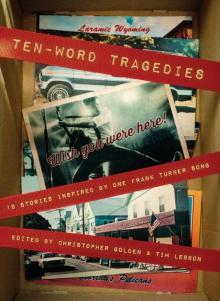 Ten-Word Tragedies
Ten-Word Tragedies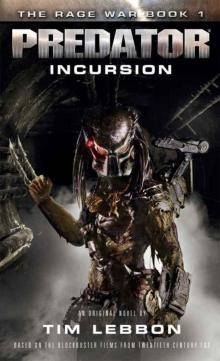 Predator: Incursion
Predator: Incursion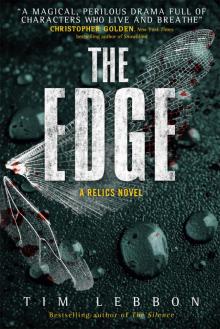 Relics--The Edge
Relics--The Edge Firefly
Firefly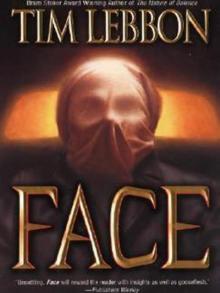 Face
Face Generations
Generations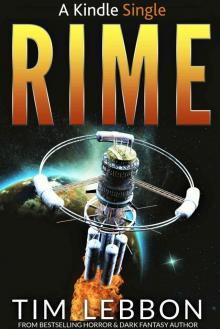 RIME (Kindle Single)
RIME (Kindle Single) Fallen
Fallen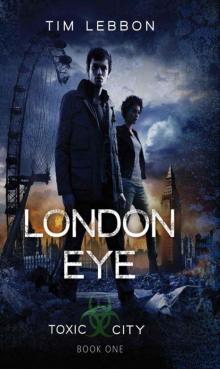 London Eye tc-1
London Eye tc-1 Kong: Skull Island
Kong: Skull Island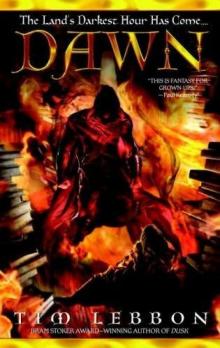 Dawn n-2
Dawn n-2 Into the Void: Star Wars (Dawn of the Jedi)
Into the Void: Star Wars (Dawn of the Jedi) The Everlasting
The Everlasting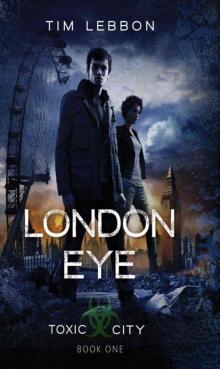 London Eye: 1 (Toxic City)
London Eye: 1 (Toxic City)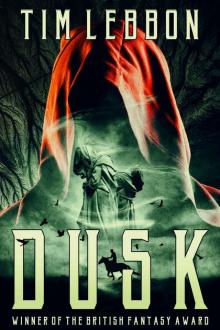 Dusk: a dark fantasy novel (A Noreela novel)
Dusk: a dark fantasy novel (A Noreela novel)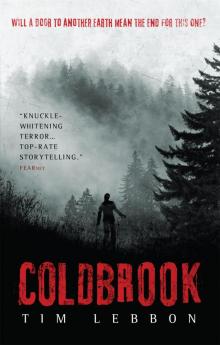 Coldbrook
Coldbrook Alien
Alien Dusk
Dusk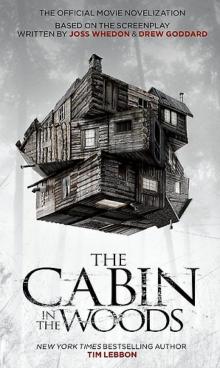 The Cabin in the Woods
The Cabin in the Woods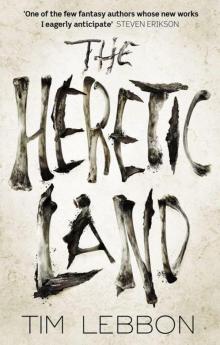 The Heretic Land
The Heretic Land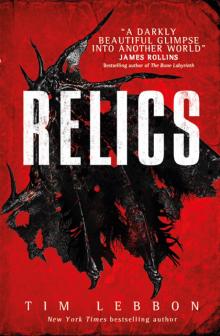 Relics
Relics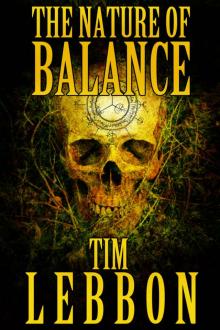 The Nature of Balance
The Nature of Balance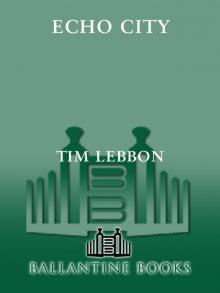 Echo City
Echo City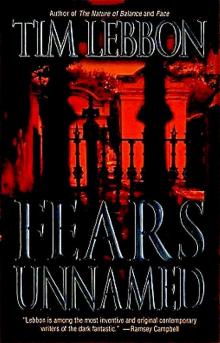 Tim Lebbon - Fears Unnamed
Tim Lebbon - Fears Unnamed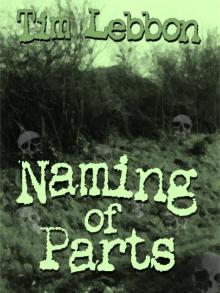 Naming of Parts
Naming of Parts Alien--Invasion
Alien--Invasion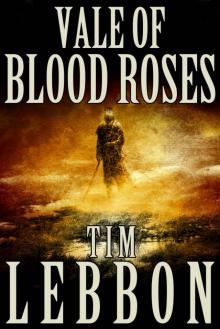 Vale of Blood Roses
Vale of Blood Roses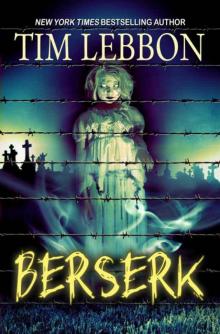 Berserk
Berserk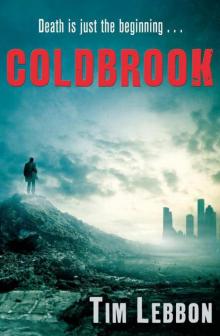 Coldbrook (Hammer)
Coldbrook (Hammer)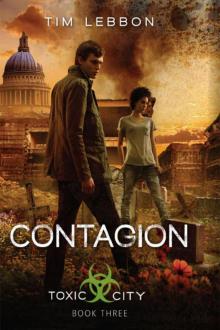 Contagion tc-3
Contagion tc-3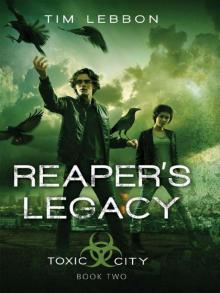 Reaper's Legacy: Book Two (Toxic City)
Reaper's Legacy: Book Two (Toxic City)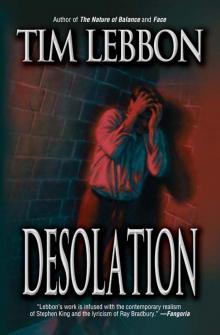 Desolation
Desolation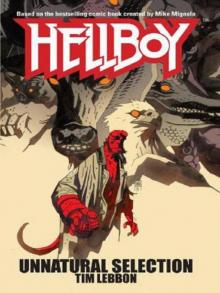 Unnatural Selection
Unnatural Selection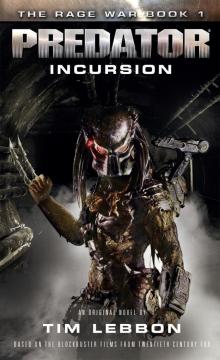 Predator - Incursion
Predator - Incursion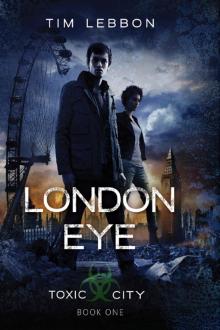 London Eye
London Eye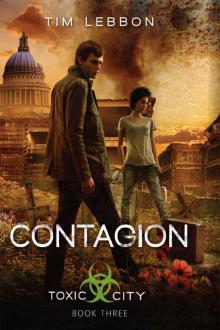 Contagion (Toxic City Book Three)
Contagion (Toxic City Book Three) The Silence
The Silence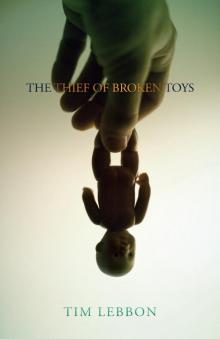 The Thief of Broken Toys
The Thief of Broken Toys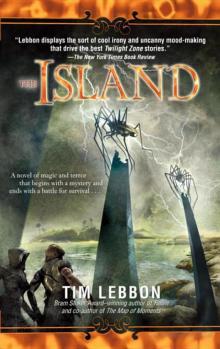 Tales of Noreela 04: The Island
Tales of Noreela 04: The Island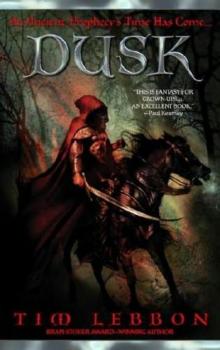 Dusk n-1
Dusk n-1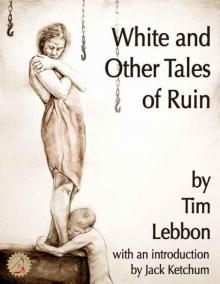 White and Other Tales of Ruin
White and Other Tales of Ruin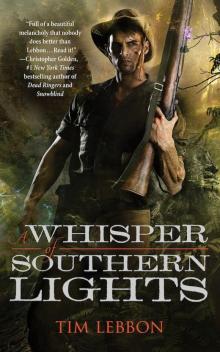 A Whisper of Southern Lights
A Whisper of Southern Lights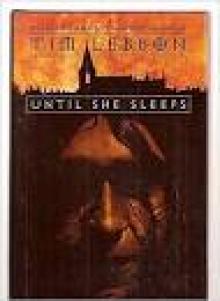 Until She Sleeps
Until She Sleeps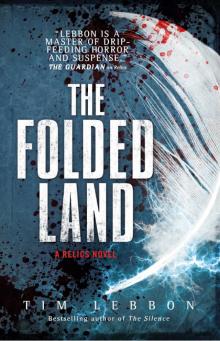 Relics--The Folded Land
Relics--The Folded Land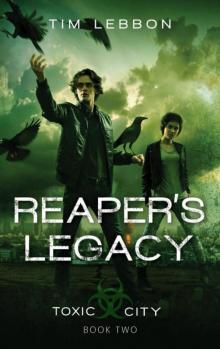 Reaper's Legacy tc-2
Reaper's Legacy tc-2 Alien: Out of the Shadows
Alien: Out of the Shadows Pieces of Hate
Pieces of Hate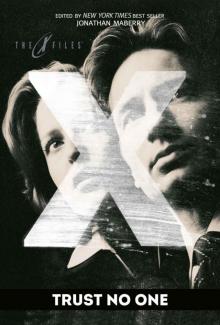 X-Files: Trust No One
X-Files: Trust No One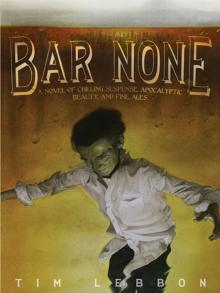 Bar None
Bar None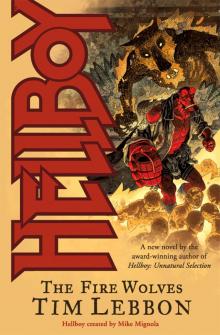 The Fire Wolves
The Fire Wolves